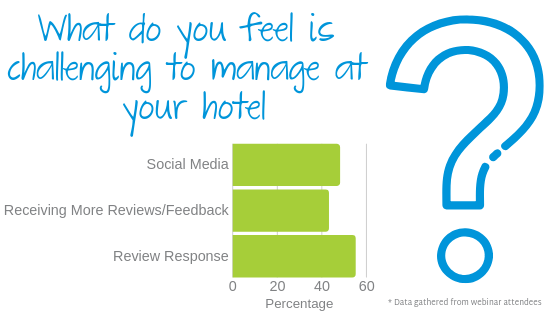Call Out Culture

Travelers are not shy about calling out hotels online by name, and it’s important to make a plan before a complaint becomes a crisis.
Evolution of Traveler Feedback
Nowadays, when one thinks about traveler feedback, they immediately think of TripAdvisor. However, TripAdvisor wasn’t where the birth of travel feedback occurred. It dates all the way back to the simple comment cards. The biggest difference between then and today is that travelers could not view the reviews being left at the front desk. Comment cards weren’t public, so they didn’t have a potential impact on future bookings. It’s safe to say we’ve come a long way since then.

Traveler Feedback Evolution Timeline
THEN: Review Sites & Social Media
Originally, social media served its own purpose as a way for people to interact and share their lives with each other. In the same tune, review sites had a specific purpose as well. They were specifically meant for guests to rate their stay, giving hoteliers a chance to respond and other travelers a chance to read their feedback.
Review Websites
- Guest Reviews
- Booking Referrals
- Customer Service
Social Media
- Friends & Followers
- Post Updates
- Share Photos
NOW: Online Reputation Combines Review Sites & Social Media
Today, any online interaction associated with one’s hotel can impact a traveler’s booking decision. Facebook is now one of the leading contributors to hotel reviews through the Facebook Recommendations feature. Also, online review sites are now a place where travelers can see photos and visually learn the experiences of other travelers. Ultimately, the features of social media and review websites now blend together and have a greater impact on bookings more than ever before.
Online Reputation Blend
- Traveler Reviews
- Updated Posts
- Booking Referrals
- Photo Sharing
- Customer Service
- Friends, Likes & Followers

Types of Communication
C2B Communication is customer to business communication. For instance, this is demonstrated when a customer calls out a business on social media. This is what we see most in today’s travel industry.
C2C Communication means customer to customer communication. In other words, this is when travelers communicate amongst each other about your hotel. This one can be the most dangerous because they can be communicating and negatively influencing travelers without your knowledge.
B2C Communication occurs from a business to a customer. For example, if your hotel concierge is managing your social accounts and they reach out to a guest, they are engaging in B2C Communication.
How to Respond to a Customer Call Out
Always Be Listening
First, you must always keep an eye out for all types of reviews. Listen to concerns about your hotel and use it as an indicator of how you can improve your hotel. You want to pay attention to current trends and set up notifications for whenever a review comes in. Don’t forget to sign up for Google Alerts too. Your main goal should be to ensure that you are prepared to give your hotel the best online presence possible.
Defuse the Situation
Next, never ignore customer call outs. Diffuse the situation immediately by apologizing and being empathetic to their review. Avoid using accusatory language, even if the client has done so themselves. The way you respond to a customer is going to represent how a prospective guest’s experience will be when staying at your hotel. As a whole, the client is leaving a review to have their concerns heard, so make sure you appropriately respond to traveler’s reviews.
Take it Offline
Also, make sure bad reviews are heard by your team but not written online for travelers to see. Do so by training your front desk to ask for feedback whenever possible. Use post-stay email surveys to direct complaints to your hotel’s inbox and avoid having issues show up on public review sites. The best thing to do is to prevent the negative review from going public, so keep it within the hotel by staying on top of guest feedback.
Know When to Ask for Help
Most importantly, know when to reach out and ask for help with your reviews. Understand what resources your brand provides and request legal assistance if needed. If you’re not addressing these issues, reach out to your vendor partners for assistance. Being on top of your hotel’s online reputation is the key to having happy guests and creating a great impression on travelers seeking to book.





0 Comments